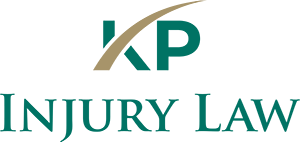
"Helping people is all I've ever wanted to do."
Kyle Peiter Founding Attorney
Personal Injury Lawyer in Goodlettsville, TN
If you were injured by someone’s negligence, our law firm can help ease your pain. We’ll fight for the compensation you deserve.
Every case is different, results may vary depening on the facts and legal circumstances. The attorney featured on this page is licensed in Tennessee and Georgia. For a full list, please see our locations page.

"Helping people is all I've ever wanted to do."
Kyle Peiter Founding Attorney
Am I Eligible to File a Personal Injury Lawsuit?
You may be eligible to file a personal injury claim depending on your answers to the three questions below. If you’re still not sure if you’re eligible to file a personal injury lawsuit, Goodlettsville attorney Kyle Peiter can provide answers during a free consultation.
Were You Injured?
To pursue a personal injury claim, you must have suffered an injury or financial loss as a direct result of an accident or incident. This includes physical injuries like broken bones, head trauma, or soft tissue damage, as well as economic damages such as medical bills, lost wages, or property repair costs. Without documented harm—whether physical, emotional, or financial—there may be no legal basis for a personal injury lawsuit.
Were You at Fault?
To have a valid personal injury claim, someone else must be at fault for your injuries. This fault often stems from negligent actions such as failing to maintain safe property conditions, allowing a dangerous dog to roam freely, manufacturing a defective product, or providing substandard medical care. Establishing that another party’s carelessness or recklessness directly caused your injuries is essential to proving liability in a personal injury case.
Were They Insured?
If the at-fault party is insured, their liability coverage may help compensate you for medical bills, lost wages, and other damages related to your injury. Many personal injury claims—such as those involving dog bites, slip and falls, or defective products—are resolved through homeowner’s insurance, business liability insurance, or professional malpractice coverage.
If the responsible party is uninsured or underinsured, you may still have legal options, including filing a personal injury lawsuit to seek compensation directly. Identifying available insurance is a crucial step in determining how your recovery will be funded.
How Long Do I Have to File a Personal Injury Claim in Tennessee?
In the state of Tennessee, you have just one year from the date of an incident to file a personal injury lawsuit. You will not be able to seek legal action after the one-year statute of limitations has expired.
There are some exceptions to the one-year deadline to file a lawsuit, but it’s in your best interests to contact our Goodlettsville personal injury law firm ASAP. Attorney Kyle Peiter can review your case and help you get the process underway so you can receive compensation to cover your medical bills and other injury-related expenses.
Why Choose KP Injury Law for Your Case
If you get seriously hurt, you don’t have to stand alone. Kyle Peiter and the team at KP Injury Law will proudly support accident victims throughout Goodlettsville and the greater Nashville area. Our personal injury firm operates on our core values of integrity, transparency, and relentless advocacy.
- Communication and Accessibility: At KP Injury Law, our team will always be accessible to you by phone, text, or email should any questions or concerns arise.
- Peace of Mind Throughout the Process: Recovering from serious injuries can be exhausting. You can rely on KP Injury Law to meet deadlines, handle the paperwork, negotiate with the insurance company, and go to battle for your interests. Our commitment to your case will give you time to focus on healing and planning for your future.
- You Pay Nothing Unless We Win: At KP Injury Law, we work on a contingency fee basis. That means clients owe us nothing unless we can reach a successful outcome in their personal injury claim. If we can’t reach a settlement or win a jury verdict, you don’t have to pay. It’s just that easy.
Get a Free Case Review from a Skilled Goodlettsville Personal Injury Attorney
Have you experienced serious injuries in an accident that wasn’t your fault? Our law firm is here to help. For a free consultation with a Goodlettsville personal injury lawyer committed to the people of Tennessee, contact KP Injury Law today.

Common Types of Personal Injury Claims
Potential Injuries
Damages in a Personal Injury Lawsuit
Common Types of Personal Injury Claims
Car Accidents
There are numerous car accidents every year in Davidson County and in communities just north of Nashville like Goodlettsville and Hendersonville. Whether you were in a single-vehicle crash, a T-bone in an intersection, a multi-car pileup, or a hit-and-run, KP Injury Law will review what happened and help you seek damages.
Truck Accidents
Semi-trucks and delivery trucks are essential for our economy, but they can cause severe injuries in collisions. These crashes are often the result of driver fatigue due to the demands of the job. Our lawyer can hold negligent truckers and trucking companies accountable when their actions injure Tennessee commuters.
Motorcycle Accidents
Motorcyclists are more vulnerable to injury than other motorists. Even with a helmet and good protective gear, a motorcyclist can suffer severe injuries. Motorcycle crashes are often caused by other drivers failing to check their blind spots, distracted driving, and inexperience on the part of the motorcyclist.
Pedestrian Accidents
Pedestrians are extremely vulnerable to injury. If you’re hit by a car while crossing the street or riding your bike, you could suffer catastrophic injuries. We can hold negligent motorists accountable for harming pedestrians, whether it’s in the Nashville area or by a school or park here in Goodlettsville.
Dog Bites and Animal Attacks
When an animal attacks, the injuries often involve physical and emotional trauma, especially with children. Victims may suffer puncture wounds, infections, or permanent scarring. KP Injury Law can hold negligent dog owners liable for failing to control their pets and keep others safe.
Slip, Trip, and Fall Accidents
Slips, trips, and falls are a major cause of injuries, and can be particularly dangerous for the elderly. Common causes of slips, trips, and falls include wet floors, uneven surfaces, and poor lighting. Owners of businesses and private properties can be held liable for these kinds of premises accidents.
Premises Liability
Premises liability encompasses any accidents that occur on other people’s property due to poor maintenance or unsafe conditions. In addition to slips and falls, these cases often involve stairs in disrepair, a lack of security, exposed wiring, exposure to harmful substances, and other property code violations.
Medical Malpractice
Medical malpractice refers to negligence by doctors, nurses, and other health care professionals. Examples of medical malpractice include surgical errors, anesthesia errors, failure to diagnose a condition, childbirth injuries, and prescribing the wrong medication. KP Injury Law is prepared to take on hospitals and medical facilities when they fail to meet the standard of care for the people of Tennessee.
Wrongful Death
If you lose a loved one because of a fatal accident, KP Injury Law can help you file a wrongful death lawsuit. Wrongful death claims help surviving family members obtain compensation and seek justice after losing a loved one because of another party’s negligent or purposeful acts. No amount of money can match the pain of your loss, but damages can help with the grieving process and offer stability during a difficult time.
Potential Injuries Suffered in Serious Accidents
Serious injuries can have lasting effects on your life. If you were hurt because of someone else’s negligence or recklessness, our personal injury lawyer in Goodlettsville will help you hold that person accountable for the harm they caused.
- Broken Bones: Slips, falls, and auto accidents often lead to broken bones and damage to the joints. Some fractures require surgery and long-term rehabilitation, especially in older adults.
- Burn Injuries: First- and third-degree burn victims often face painful treatment and the risk of permanent disfigurement.
- Lacerations and Scarring: Deep cuts may require reconstructive surgery to help minimize disfigurement and permanent scarring.
- Infections: Dog bites and untreated wounds can lead to serious infections. In some cases, infections worsen due to delayed treatment by medical professionals.
- Loss of Limbs: Losing a limb drastically alters a person’s lifestyle and livelihood, and often requires lifelong care and a prosthesis.
- Traumatic Brain Injuries (TBI): Traumatic brain injuries can have long-term or even permanent effects on memory, mood, and cognitive function.
Spinal Cord Injuries (SCI): Injuries to the spinal cord can result in varying degrees of paralysis. Accident survivors often need a wheelchair for mobility for the rest of their lives.
Catastrophic Injuries Can Have Lasting Repercussions
Catastrophic injuries are any kind of physical trauma that results in long-term or permanent disability. This includes the loss of a limb, paraplegia, quadriplegia, and the loss of your vision or hearing.
Suffering a catastrophic injury can dramatically change your quality of life and your ability to earn a living. You may need to change careers because of a major injury, and you may also need to renovate your home to accommodate a wheelchair or be otherwise accessible.
If you suffered a catastrophic injury, you can count on our law office in Goodlettsville, TN. Personal injury attorney Kyle Peiter will consider the ways the injury has changed your life and will make sure these facts are reflected while seeking compensation.
Damages in a Personal Injury Lawsuit
Damages in a personal injury case are intended to compensate accident survivors for their losses, making them whole in the process. Most personal injury claims involve economic and non-economic damages. Our Goodlettsville personal injury attorney can evaluate how your injuries affected your life and help you see the true value of your claim.
Economic damages are the types of injury-related losses that are easy to put a number on. Examples of economic damages include:
- Medical Expenses: This covers emergency services, hospitalization, surgery, physical rehabilitation, follow-up doctor and specialist visits, and the need for assistive devices after recovery.
- Property Damage: This covers damage to a vehicle as well as damage to any personal belongings you had at the time of the incident.
- Lost Wages: This covers any loss of income due to missed work or extended leave as a result of your injuries.
Lost Future Earnings: This covers any loss of future earnings if your injuries caused a disability that changes your career prospects.
Non-economic damages are the types of injury-related losses that are not as easy to quantify. Examples of non-economic damages include:
- Pain and Suffering: This covers the pain you’ve endured as well as any persistent or chronic pain after you’ve recovered from your injuries.
- Reduced Quality of Life: This covers adverse changes to your ability to do daily tasks and the inability to pursue past hobbies or interests due to your injury.
Loss of Consortium: This covers the ways an injury has negatively affected your relationships, which includes problems with companionship and intimacy.
In rare cases, you can also seek punitive damages in a personal injury lawsuit. These types of damages are meant to punish the negligent party for their actions. To receive punitive damages, there must be clear and convincing evidence that the liable party acted maliciously, intentionally, fraudulently, or recklessly.
When you work with our personal injury law firm in Goodlettsville, our attorney will let you know if punitive damages can be sought based on the nature of the incident.
Can I Still File a Lawsuit If I Was Partially at Fault?
Yes. Tennessee is a modified comparative negligence state. That means you can still receive damages in a personal injury lawsuit as long as you are less than 50% at fault. If you are 50% or more at fault, you cannot seek compensation. Your share of liability is deducted from your damages.
For example, say that you were awarded $100,000 in damages in a personal injury lawsuit and were determined to be 20% at fault. Because of modified comparative negligence, you would ultimately be awarded $80,000.
Never admit fault or partial responsibility to the insurance company. Discuss what happened with personal injury attorney Kyle Peiter. He will consider the evidence and advise you on the best course of action to maximize compensation.
Contact Our Personal Injury Lawyer in Goodlettsville, TN
If you’ve been seriously hurt in the greater Nashville area, don’t go it alone. Kyle Peiter and his team are ready to listen to you and fight for justice. To set up a free case review with a caring personal injury lawyer in Goodlettsville, TN, contact KP Injury Law today.
